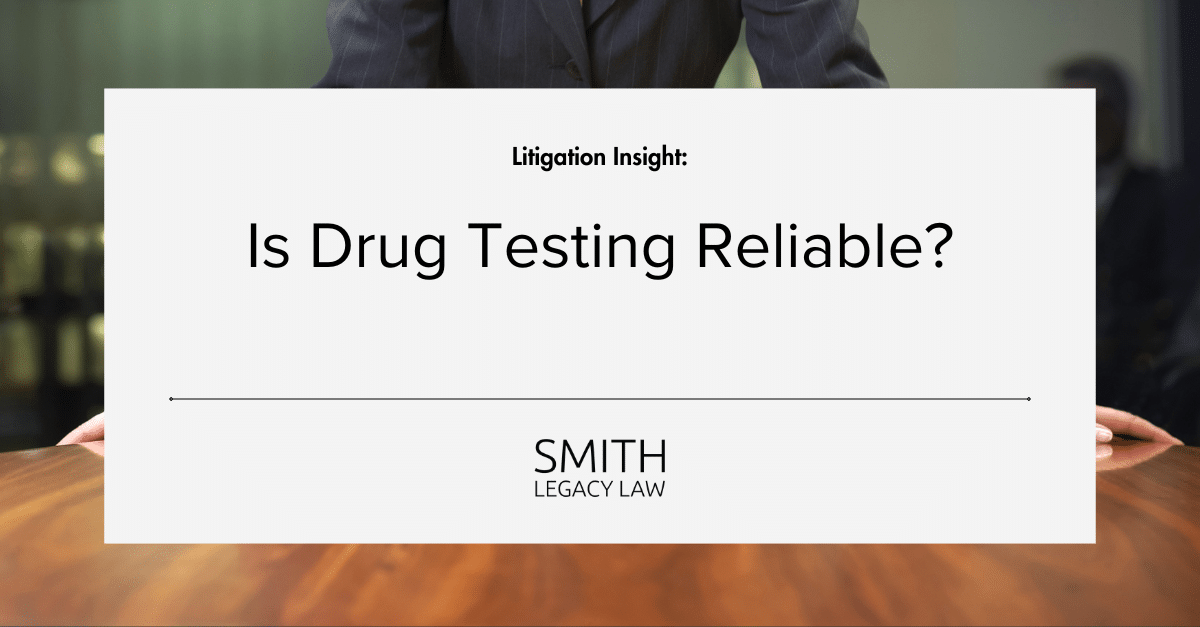While many people will never be drug tested in their lives, the issue is coming up in more settings than ever before. Drug testing is common in certain jobs, criminal cases, schools, healthcare institutions, child custody matters, and other areas. As a result, it is critical to understand the limitations of that testing should you be the tester or one being tested.
When Is Drug Testing Used?
Some employers may require drug testing prior to hiring as a condition of employment, periodic or random testing during employment, or testing after a workplace accident. Typically, the rationale is to ensure workplace safety, comply with government regulations, or reduce insurance and worker’s compensation costs.
Law enforcement and hospitals may drug test in suspected DWI and DUI cases, accident investigations, and other criminal cases.
Courts may order drug testing in child custody cases. For instance, one spouse may be accused of substance abuse which may be relevant to the issue of custody and parenting time. Child protective services or schools may also seek to test children for drugs.
What Methods Are Used to Test for Drugs?
Typically, drug testing is done by breathalyzer (for alcohol) or blood, urine, saliva, or hair analysis. A key issue in choosing a method of drug testing is whether the tester wants to know whether someone is under the influence at the moment or has taken drugs in the past. Also relevant is when and how a person needs to be tested, such as in a public location versus a laboratory.
Urinalysis can detect drug usage within a certain period of time since substances will gradually go out of someone’s system. Samples are usually collected at a lab. Saliva is used for certain drugs, is relatively easy to collect, and provides quick results. Hair testing can detect drug use in the past 90 days but doesn’t indicate whether someone is under the influence at the moment. It is considered to be quick, low-cost, and easy to administer, particularly in public places like schools. However, it is the least reliable.
Importantly, the U.S. Department of Transportation has adopted standards for blood and breath testing that apply to any federal government employee or federal contractor under the Drug-Free Workplace Act. Hair testing is not federally mandated nor permitted but may be used in other settings outside of federal employees and contractors.
Are Drug Tests Reliable?
The standard for admissibility of scientific evidence requires that the court determine whether the reasoning or methodology underlying the scientific theory or technique in question is scientifically valid and whether that reasoning or methodology properly can be applied to the facts in issue. Essentially, the scientific evidence must be both reliable and relevant.
Firmly established methods of drug testing like Gas Chromatography/Mass Spectrometry of urine are considered reliable because of years of scientific validation. However, hair testing is not necessarily accepted as reliable. The Connecticut Superior Court in Tauck v Tauck found that the scientific literature has reported problems with the collection, testing, and measurement procedures involved in hair testing. This includes a lack of uniform procedures and inconsistent standards for interpreting results. As a result, if a party seeks to use this evidence, courts must conduct a hearing to determine whether to admit the results of a particular test.
Can You Challenge the Results of a Drug Test?
Unfortunately, many parties that use drug testing aren’t familiar with the science behind the testing and when and how to use a test. Attorneys and judges may also lack sufficient knowledge. This can make it difficult to challenge results.
Drug tests can have serious consequences costing you your job, education, access to your children, and even your freedom. Accordingly, if you are facing a court-mandated drug test or have been told your drug test was positive, it is critical to consult a knowledgeable attorney who can advocate on your behalf and ensure fair and reliable testing. We have extensive experience representing clients where drug testing was at issue. Contact us to discuss how we can help you with your case.
